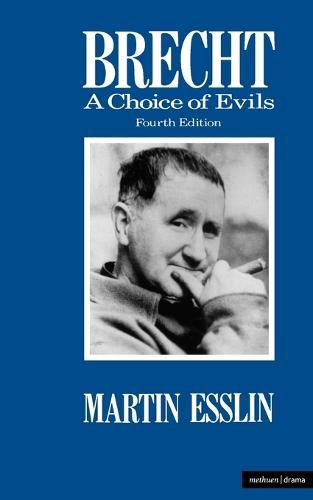Overview
""A brilliantly perceptive study of the most ambiguous and perpetually fascinating figure of the twentieth century European theatre"" (Kenneth Tynan) Brecht's influence on the theatre may well be as powerful as Kafka's influence on the novel and this study of Brecht's life and work was unanimously well received when first published just after the writer's death in 1959. This book portrays the paradox of a man whose work was admired on the Western side of the Iron Curtain despite ideological differences whilst in the East his artistic output was criticised but his communist ideas were welcomed. This authoritative text has stood the test of time
Full Product Details
Author: Martin Esslin
Publisher: Bloomsbury Publishing PLC
Imprint: Methuen Drama
Edition: New edition
Dimensions:
Width: 12.70cm
, Height: 1.90cm
, Length: 20.30cm
Weight: 0.390kg
ISBN: 9780413547507
ISBN 10: 0413547507
Pages: 320
Publication Date: 09 February 1984
Audience:
General/trade
,
College/higher education
,
Professional and scholarly
,
General
,
Tertiary & Higher Education
Format: Paperback
Publisher's Status: Active
Availability: Manufactured on demand

We will order this item for you from a manufactured on demand supplier.
Reviews
This is a penetrating and often brilliant study of Bertolt Brecht, best known in America for his immensely popular Phreepenny?? Opera. But few here realize that he was also the author of at least a dozen other plays, of volumes of satiric verse, and of short stories, and was hailed as the apostle of a new dramatic era . Brecht's life and work was shaped by the grim events of the first World War, of the depression, revolution and rise of Hitler. During this time he wrote poems and plays that can best be described as the literary counterpart of the savage drawings of his close friend, George Gross. Opposed to Hitlerism, a strong propagandist, Brecht left Germany- spent some time in America, and ultimately returned to East Berlin where the Communists offered him a theatre and the Stalin Peace Prize.... Esselin makes abundantly clear the subtle, paradoxical, cynical creed which has motivated Brecht and has provided a first-rate interpretation of the little known artist, one of the more important exponents of post war expressionism. (Kirkus Reviews)
Author Information
Martin Esslin was the author of such ground-breaking classics as The Theatre of the Absurd and Brecht: A Choice of Evils, as well as The Field of Drama in which he focused on the semiology of drama. He joined the BBC in 1940 and was head of Drama (Radio) from 1963-1977. He published many collections of essays including Brief Chronicles: Essays on Modern Drama and Mediations: Essays on Brecht, Beckett and the Media. His critical articles used to appear regularly in Plays and Players, Encounters and many other periodicals. He was also a well-known translator of plays, particularly by German-speaking dramatists. He died in 2012.



